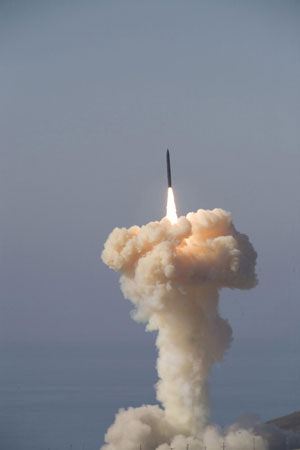
WASHINGTON - The United States is seeking to build regional shields against ballistic missiles in both Asia and the Middle East akin to a controversial defense system in Europe, a s enior Pentagon official disclosed on Monday.
|
 Undated handout image courtesy of Boeing shows a test of the Ground-based Midcourse Defense system. The US Defense Department said on December 30, 2011 it was awarding Boeing a $3.48 billion, seven-year contract to develop, test, engineer and manufacture missile defense systems. [Photo/Agncies] |
The effort may complicate US ties with Russia and China, both of which fear such defenses could harm their security even though the United States says they are designed only to protect against states like Iran and the Democratic People's Republic of Korea (DPRK).
The US push for new anti-missile bulwarks includes two sets of trilateral dialogues - one with Japan and Australia and the other with Japan and South Korea, said Madelyn Creedon, an assistant secretary of defense for global strategic affairs.
Such shields could help counter perceived threats to their neighbors from Iran and Pyongyang and help defend the United States from any future long-range missiles that the two countries might develop, she told a conference co-hosted by the Pentagon's Missile Defense Agency.
The model would be the so-called "phased adaptive approach" for missile defense in Europe, Creedon said. This includes putting interceptor missiles in Poland and Romania, a radar in Turkey and the home-porting of missile defense-capable Aegis destroyers in Spain.
Moscow fears that such a shield, given planned upgrades, could grow strong enough by 2020 to undermine Moscow's own nuclear deterrent force. It has threatened to deploy missiles to overcome the shield and potentially target missile defense installations such as those planned in NATO members Poland and Romania.
China likely would be even more opposed to an anti-missile shield in its backyard, said Riki Ellison, a prominent missile-defense advocate noted for his close ties to current and former US senior military officials involved in the effort.
GULF STATES
In the Middle East, Creedon said Washington will work to promote "interoperability and information-sharing" among the members of the Gulf Cooperation Council - Saudi Arabia, Kuwait, Bahrain, Qatar, the United Arab Emirates and Oman - as they acquire greater missile-defense capabilities.
The biggest US missile defense contractors include Boeing Co, Lockheed Martin Corp, Raytheon Co and Northrop Grumman Corp.
The Obama administration at the same time stepped back from an announcement this month that it was weighing the possibility of giving Russia certain classified missile-defense data as the price for winning its acquiescence to the European shield.
"We are not proposing to provide them with classified information," Ellen Tauscher, the administration's special envoy for strategic stability and missile defense, told the conference. Instead, she said, the Obama administration had offered Moscow a chance to monitor a flight test in international waters of a US Standard Missile-3 interceptor.
This, she said, would let Russian officials see for themselves the accuracy of "what we are saying about our system." The United States argues that the US system poses no threat to Russia's nuclear deterrent.
As recently as March 6, the administration had said it was continuing negotiations begun under former President George W. Bush on a pact with Moscow that could include sharing limited classified data, but said it was making no headway toward a deal with Russia.
Obama's administration was not the first "to believe that cooperation could be well-served by some limited sharing of classified information of a certain kind if the proper rules were in place to do that," Bradley Roberts, a deputy assistant secretary of defense, had told the House of Representatives' Armed Services subcommittee on strategic forces at the time.
The idea of such data-sharing drew sharp criticism from Republicans in the US Congress including a move to legislate a prohibition.
The rollback on any such deal involving classified data exchange came after President Barack Obama was caught on camera on Monday assuring outgoing Russian President Dmitry Medvedev that he would have "more flexibility" to deal with contentious issues like missile defense after the November 6 US presidential election.
Obama, during talks in Seoul, urged Moscow to give him "space" until after the vote, and Medvedev said he would relay the message to Russian President-elect Vladimir Putin.